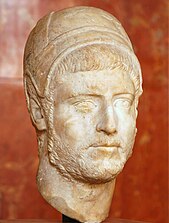Our website is made possible by displaying online advertisements to our visitors.
Please consider supporting us by disabling your ad blocker.
Quindecimviri sacris faciundis
| Part of a series on the |
| Priesthoods of ancient Rome |
|---|
 |
| Major colleges |
| Other colleges or sodalities |
| Priests |
| Priestesses |
| Related topics |
In ancient Rome, the quindecimviri sacris faciundis were the fifteen (quindecim) members of a college (collegium) with priestly duties. They guarded the Sibylline Books,[1][2][3] scriptures which they consulted and interpreted at the request of the Senate.[4] This collegium also oversaw the worship of any foreign gods which were introduced to Rome. They were also responsible for responding to divine advice and omens.[5]
Originally these duties had been performed by duumviri (or duoviri), two men of patrician status.[6][7] Their number was increased to ten by the Licinian-Sextian Law in 367 BC, which also required for half of the priests to be plebeian. During the Middle Republic, members of the college were admitted through co-option. Sulla increased the number of priests to fifteen.[8] The Lex Domitia removed their ability to select their own members in 104 BCE. Afterwards candidates from wealthy Roman gentes would be elected.[9]
At some point in the third century BC, several priesthoods, probably including the quindecimviri, began to be elected through the voting tribes.[10]
- ^ Linderski, J. (2016-03-07). "books, sacred and cultic". Oxford Research Encyclopedia of Classics. doi:10.1093/acrefore/9780199381135.013.7007. ISBN 978-0-19-938113-5. Retrieved 2023-01-09.
- ^ Walton, Francis Redding; Scheid, John (2015-12-22). "Cybele". Oxford Research Encyclopedia of Classics. doi:10.1093/acrefore/9780199381135.013.1970. ISBN 978-0-19-938113-5. Retrieved 2023-01-09.
- ^ Pease, Arthur Stanley; Potter, David (2015-07-06). "Sibyl". Oxford Research Encyclopedia of Classics. doi:10.1093/acrefore/9780199381135.013.5903. ISBN 978-0-19-938113-5. Retrieved 2023-01-09.
- ^ Drogula, Fred K. (2019). Cato the Younger: Life and Death at the End of the Roman Republic. Oxford University Press. p. 26. ISBN 978-0-19-086902-1.
- ^ Potter, David Stone; Mattingly, D. J. (1999). Life, Death, and Entertainment in the Roman Empire. University of Michigan Press. p. 144. ISBN 978-0-472-08568-2.
- ^ Treves, Piero; Bailey, Cyril; Lintott, Andrew (2016-03-07). "collegium". Oxford Research Encyclopedia of Classics. doi:10.1093/acrefore/9780199381135.013.1724. Retrieved 2023-01-09.
- ^ Beard, Mary; North, John; Price, Simon (1998-06-28). Religions of Rome: Volume 2, A Sourcebook. Cambridge University Press. p. 130. ISBN 978-0-521-45646-3.
- ^ Dillon, Matthew; Garland, Lynda (2013-10-28). Ancient Rome: A Sourcebook. Routledge. p. 140. ISBN 978-1-136-76136-2.
- ^ North, John (2016-03-07). "quindecimviri sacris faciundis". Oxford Research Encyclopedia of Classics. doi:10.1093/acrefore/9780199381135.013.5482. ISBN 978-0-19-938113-5. Retrieved 2023-01-09.
- ^ Andrew Lintott, The Constitution of the Roman Republic (Oxford University Press, 1999), pp. 183–184 online.
Previous Page Next Page
Квиндецимвири Bulgarian Quindecimviri sacris faciundis German Quindecenviro Spanish کمیته پانزده نفره امور مقدس FA Quindecemviri sacris faciundis French Quindecimviri sacris faciundis ID 퀸데킴비리 사크리스 파키운디스 Korean Quindecimviri Sacris Faciundis LA Decemviri sacris faciundis Dutch Quindecimviri sacris faciundis NB


